Microsoft needs to get serious about mobile (now) or don't even bother
Microsoft is seemingly rebooting Windows on phones yet again, owing at least in part to "CShell."
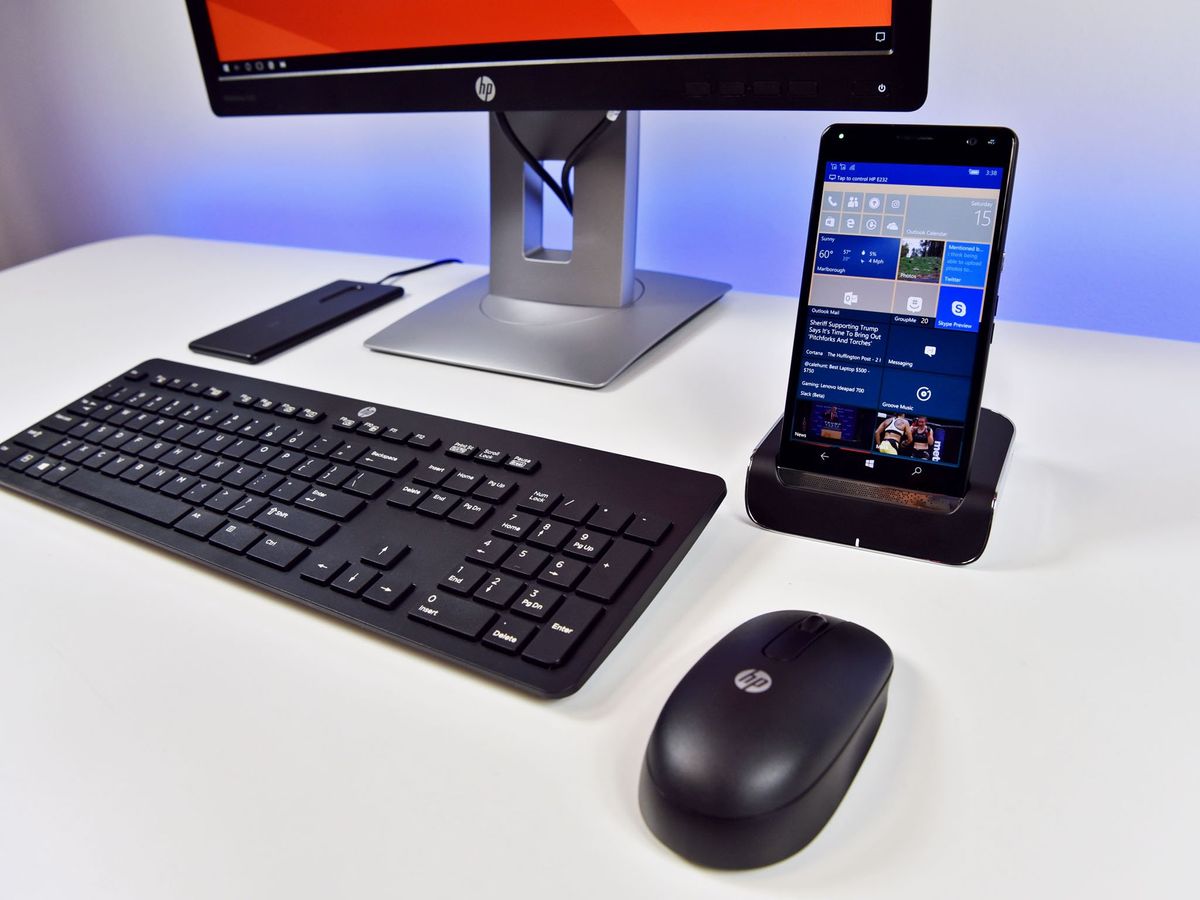
CShell is a new way of thinking about Windows. Microsoft is working towards a modular and adaptable Windows that will scale across all sorts of devices, architectures and screen sizes. That includes mobile, with support for cellular and ARM-based phone chipsets. To see the early stages of CShell in action, make sure you see our Senior Editor Zac Bowden's video below.
Even beyond phones, Windows on ARM with CShell in tow will lead to innovation in the PC space, perhaps creating entirely new categories, as seen on the Microsoft Surface. However, if this is all part of a Microsoft play to edge back into the phone market after its hardcore "retrenchment," the company needs to get serious or don't even bother.
No more, "If we build it, they will come"
Microsoft's complacency towards its own app store compounds a wider problem that will crush any future mobile or tablet efforts. Microsoft staples, such as Skype, see their biggest updates on Android and iOS first, often before hitting the Windows 10 Store. I understand Microsoft is going where the users are, but when it comes to the Universal Windows Platform (UWP), it doesn't exactly exude confidence. Microsoft needs to prove its commitment to both consumers and devs, who Microsoft must depend on if it genuinely wants to see the platform be successful.
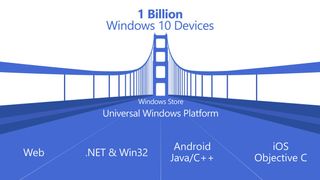
We always hear about Windows 10's march toward a billion devices, but the Windows 10 Store is largely barren, particularly so when it comes to quality UWP apps, which any future Windows 10 phone OS will rely on.
I can't remember the last time we saw a big name service jump on the UWP train.
Project Centennial apps like Spotify won't run on any device that doesn't contain the Win32 APIs Microsoft is slowly trying to get away from. It's time to get aggressive.
Start giving people a reason to care about UWP. Showcase its capabilities with compelling new hardware categories that confidently carry the Surface branding. Build a suite of creative apps that run entirely as UWP programs. Where's the UWP equivalent of Garage Band or Final Cut Pro?
It's time to stop presuming devs will build for native UWP simply because it exists on a load of PCs. It's time to give average consumers real reasons to want to use UWP apps because right now I can't remember the last time we saw a big name service jump on the UWP train.
Get the Windows Central Newsletter
All the latest news, reviews, and guides for Windows and Xbox diehards.
Prove that you want Windows on phones to be successful

Microsoft's "retrenchment" and the company's attitude towards mobile fans, mobile devs, and even OEMs, is nothing short of aggravating. Frankly, I'm not sure why any of us would be insane enough to give the company the benefit of the doubt in this space ever again. However, because I am insane, I would jump on a Surface Phone faster than a ninjacat on a unicorn. Many others (rightfully) will be skeptical.
When it comes to phones, Microsoft is synonymous with crushing failure.
As such, Microsoft needs to actually fight for the right to exist in that market. The company has seen success with Surface, but that's arguably because PCs are synonymous with Microsoft. When it comes to phones, Microsoft is synonymous with crushing failure.
The "Surface Phone" can't be a simple phone; it needs to be something unique, something that'll at least distract from the fact the app store is a wasteland. Other devices from OEMs also need to be a different, leveraging CShell's adaptability. As much as those phones need to be unique, they also need a mammoth marketing push.
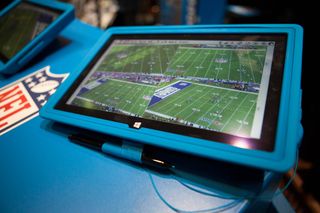
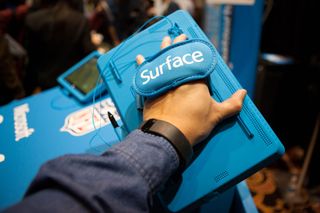
For Surface, Microsoft hooked up with the NFL, it injected the devices into various TV shows, and now and then, I see Surface ads across the internet. Microsoft didn't market the Lumia 550, 650, or 950 devices at all, nor did it market the underrated Microsoft Band. If the company is somehow able to nail a new mobile device category, with compelling hardware, worthy of the "Surface" brand, it needs a marketing campaign to match.
Microsoft must show developers and consumers it's back in the game, and that this isn't just some vanity project it hopes will take off by the merits of its existence. The company needs to make people care, and make people confident in the long-term commitment to the space. Right now, it looks like Microsoft couldn't care less.
Get the whole company behind it
Not only does any new Microsoft phone effort need to have the input of Windows and Surface, but it also needs support from Xbox and Windows Mixed Reality.
Apple's ARKit for iPhone is already defining the future of augmented reality (AR), while HoloLens languishes with a small, but passionate (albeit amazing) dev community, and the promise of "affordable" 2017 head-mounted displays (HMDs), that honestly, few will buy. At least for the foreseeable future, the development of AR will be dictated by smartphone cameras, an area in which Microsoft is simply not a major player. It risks, once again, giving a future ecosystem away to Apple.
Apple is putting AR in consumer's hands today, while Microsoft waits.
Any future phone effort needs an AR play, if for no reason other than to build up the ecosystem to be ready for any sort of sci-fi hologrammatic future. Where's the 3D scanning app Microsoft demonstrated previously using an HP Elite x3 phone? Why isn't the company leveraging the assets in Remix3D.com to add Snapchat-like AR features to Skype on UWP? It all feels so disconnected right now, while Apple runs away building a cohesive AR ecosystem across its devices that could prevent Microsoft from ever getting a foot in.
Will this AR app ever see the light of day?
Mircosoft's Xbox division also built decent games for Windows phones, including Halo Spartan Assault, Halo Spartan Strike, Age of Empires: Castle Siege, and Tentacles: Enter the Mind. Any future phone effort needs the support of Microsoft Studio's biggest brands, perhaps with unique features for Xbox owners. Nintendo's tablet-like Switch has proven that there's a market for core gaming on the go, so why not leverage Xbox in any CShell-defined mobile effort, too? The GPD Win pocket PC depicted below offered a glimpse at what real Xbox mobile gaming could look like - even without the friendliness of CShell for its tiny screen.

Get serious or don't even bother
As much as Microsoft wants to think it's building the ecosystem of the future with platforms like UWP and Windows Mixed Reality, the fact that the company gave up in mobile will cost it a crucial bridge to the gradual maturing of those sorts of markets. I'm not convinced the "rectangular smartphone" Microsoft seems to shrug off will die out anytime in the foreseeable future. The company's desperation to avoid the topic of OSes on phones could be a bigger mistake for Redmond than even Vista. Why choose UWP for app development when the bulk of Windows 10 devices are desktop PCs where the web and Win32 are kings?
Microsoft's diverse portfolio across Xbox, Office, and Azure will solidify its long-term survival, but its dismissal of phones might not save Windows, in a world where people increasingly use their phones for all computing needs that aren't work-related. PC sales are still in a downward trend, and Android has overtaken Windows as the world's most-used OS online.
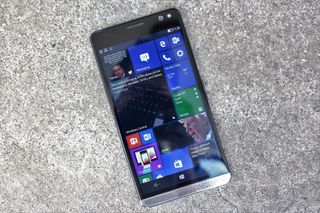
If Windows has a future in consumer computing, it will likely be CShell-shaped, but the company needn't bother with this gargantuan engineering effort to change the very shell of what Windows is if the marketing, messaging, and devices aren't there to make use of it.
Microsoft, I implore you, for the sake of the amazing Windows devs building these features, for the sake of OEM partners you will ask to build future Windows phones, and for the sake of indie devs and consumers you've burned time and time again with your perpetual reboots and strategy changes — get serious or don't bother.

Jez Corden is the Executive Editor at Windows Central, focusing primarily on all things Xbox and gaming. Jez is known for breaking exclusive news and analysis as relates to the Microsoft ecosystem while being powered by tea. Follow on Twitter (X) and Threads, and listen to his XB2 Podcast, all about, you guessed it, Xbox!